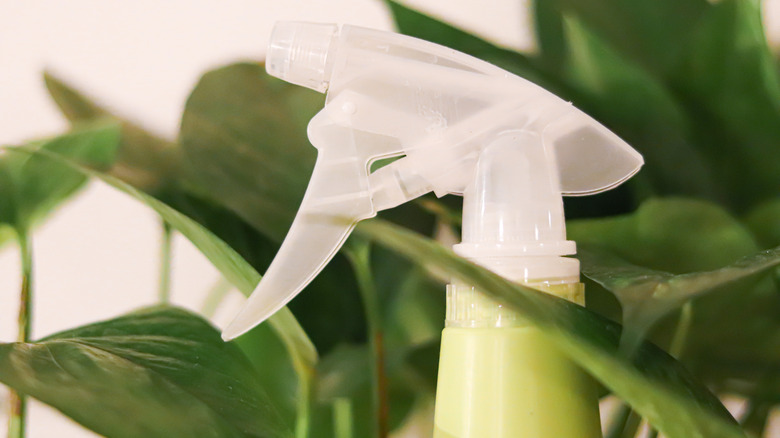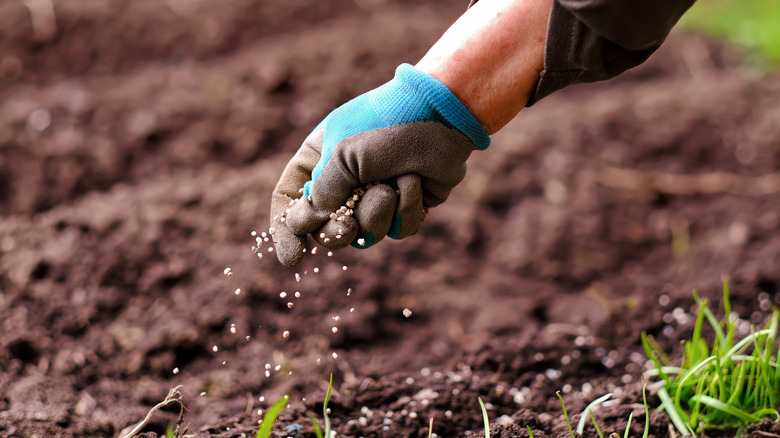Why People Use Vinegar To Get Rid Of Clover (And Other Alternatives To Consider)
Clovers are tricky. While they're widely considered a sign of good luck, finding clovers in your garden isn't always a pleasant sight. Some gardening enthusiasts perceive clovers as garden weeds to get rid of because they spread quickly, look unappealing to some people, and stain clothing more than grass. However, unlike weeds, clovers aren't physically harmful to other plants. That's why some gardeners actually prefer and purposely plant clover lawns. They're decorative, ecological, and relatively low-maintenance.
Deciding whether or not to plant a clover lawn is a personal decision made by gardeners. If they choose to get rid of these clovers, spot-treating the area with vinegar is a natural yet effective way to do so. Other alternatives include using unlikely natural remedies like nitrogen-rich fertilizers and corn gluten.
There are many reasons why homeowners choose to use vinegar in their garden, and when it comes to terminating unwanted plants like clover, the acidic properties found in vinegar come in handy. When you pour or spray vinegar over the plants, it begins to dissolve the cell membrane and ultimately dehydrates and kills the cell tissue. If you've just come across clover trespassing in your garden, there are a few ways to use vinegar to remove it. On the off chance that vinegar doesn't work, there are a few alternatives that might just be able to do the job.
How to use vinegar to get rid of clovers
To begin terminating clovers from your garden, start by creating a vinegar mixture. Combine 1 cup of vinegar, 1 cup of water, and a drop of dish soap in a spray bottle. Shake the bottle a few times to ensure all the ingredients have completely mixed together before spraying the patch of clovers you're trying to remove. While none of the ingredients used are highly toxic, be careful not to spray the mixture onto any companion plants or nearby grass. Spray every sunny day, avoiding the rainy ones. Continue with this process until your weeds are dead — it could take several weeks — and notice how your clover patch grows small over time.
After a few weeks, your clover patch should ideally be gone (hopefully never to be seen again). Although it's a relief, your empty clover patch may need a new and healthy plant to take its place. Consider filling the space by reseeding with grass seeds, preparing for spring flowers, or adding an outdoor structure like a bird bath or hummingbird feeder.
Alternatives for removing clovers
In terms of preventative steps, corn gluten is another natural and effective way to keep clovers from growing in your garden by acting as an organic herbicide. In case you haven't heard of corn gluten before, it's a byproduct of processed corn that's rich in protein and perfect for lawn care. To use the product, apply about 20 pounds of corn gluten per every 1,000 square feet of clover, water over the targeted patch, and allow the corn gluten to dry. The corn gluten will prevent clover seeds from sprouting, but be sure not to pour the gluten over other seeded patches where you're growing warranted plants.
Thankfully, corn gluten won't damage your garden but simply acts as a natural repellant for budding (and unwanted) plants. It's also rich in nitrogen, so instead of using an artificial nitrogen fertilizer, corn gluten can act as a non-toxic placeholder, discouraging clover growth. Be sure to note that, while corn gluten is a great option for attacking weeds, it works best when weeds are still germinating. Applying corn gluten to weeds that have already grown may only encourage them to thrive. Instead, keep an eye out for what's growing in the cracks of your driveway and get to work immediately.



